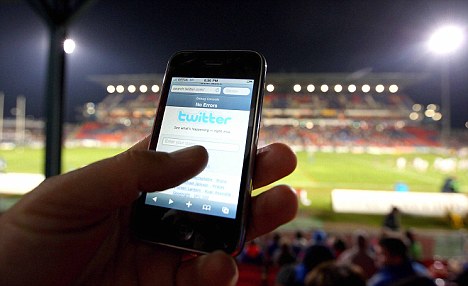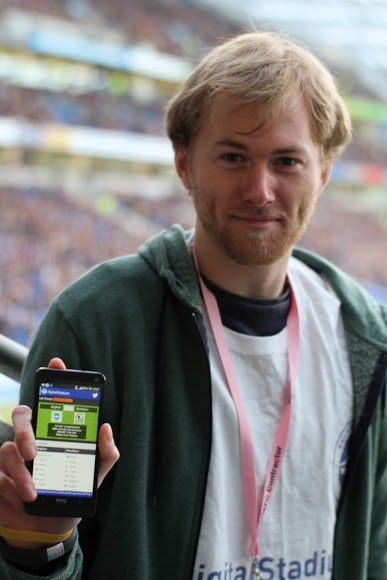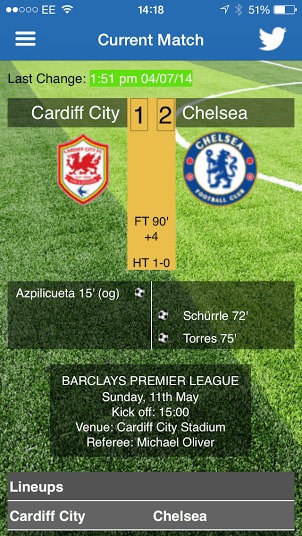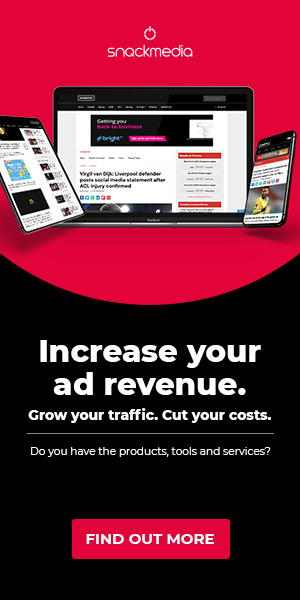New club app from Football League the answer to match-day internet access?
Last year a project called Digital Stadium was being tested in a collaboration between the University of Sussex, Brighton & Hove Albion FC and Corridor Design which looked at how modern smartphone apps can be used to build new ways of communicating within stadiums.
Currently the ideal of making stadiums ‘fully connected’ comes at a huge expense. Only the likes of Manchester City, Celtic, Rangers, Liverpool (in one stand) and other teams in the US and Europe have invested in such projects which can cost £1m+. With many stadiums starting the creak with age its not something as easy as many might think to set up.
So for clubs in the Football League it presents many problems. With many spending more than they bring in on players in a bid to hit the heights of the Premier League, they just don’t have the resources to invest in projects such as stadium connectivity. It’s not that they don’t want to better engage with fans and give them an enhanced experience – which is becoming a must – it’s just down to resource.
But where there is a scarcity there often comes innovation. And this is the problem in which the Digital Stadium project has looked to become the ultimate solution. The benefits for clubs are obvious; better customer experience, food/ticketing offerings, expanded sponsorship options, use of player/match data to enhance the match day experience, in play betting, etc.
But the high numbers of people in a small space, all of whom now expect to be able to get online whenever they want to, has led to many problems in nailing the solution. Dr Ian Wakeman, founder of the company behind the app, told theengineer.co.uk:
“Typically when you go to a football match you’re in a crowd of 30,000 people and those people are all contesting for the available basestation bandwidth. Most people can’t get a connection and you have a really bad experience on your mobile phone. TribeHive uses software rather than hardware to build a network directly between all of the mobile phones running the app and shares the connectivity you can get to pull down updates.”
The initial prototype Android apps were first deployed in April 2013 to 100 volunteer season ticket holders at Brighton, and were refined over a number of iterations till the underlying networking technology was robust, and was deployed stadium wide on the Play Store from September 2013. The Apple iOS version soon followed.
#QPR APP: We've launched a new smartphone app designed to improve matchday connectivity http://t.co/X8je1gUIuw pic.twitter.com/j4w68OX1NA
— QPR FC (@QPRFC) August 7, 2014
The app provides services the fans want, from live scores, match statistics, league tables, fixtures and results, through to news and player profiles. Live rail and bus information eases the journey of fans into and out of the stadium, whilst the ability to see both club and personal Twitter timelines, and to post Tweets whilst at the match increased the club’s social media profile.
For the club, a scrolling ticker at the bottom of the app delivered customisable messages to the fans, allowing the club to deliver messages appropriate to the match, such as beer discounts after the match. The app delivered detailed analytics of what fans looked at, all accessible through a customised web console.
Technically, the app demonstrated that the DTN technology could increase the apparent connectivity by over 50%, particularly at key times, such as pre-match, half-time and immediately post-match. The feedback from the fans was that the app was a great success, proving the acceptability of this space-age technology to football fans.
An expanded version of the app is now being trialled by six clubs – QPR, Birmingham City, Bolton, Brighton & Hove Albion, Middlesbrough and Watford. It looks on the face of it to be a normal club app that brings together latest club news, results, live scores, etc. But there is more to it than that. The Software developed by TribeHive (the business spun out from the Digital Stadium project and run by Dr Ian Wakeman) improves connectivity in the stadium by building a network directly between smartphones and sharing updates to the app.
So for both clubs and the fan attending games this solution could be a godsend to them. At April’s Manchester event we spoke with Everton’s Scott McLeod said that they had looked at most of the Wi-Fi options for Goodison Park without finding a solution that he felt suited their needs and budget. Something like this could be a perfect fit.
So what does the future hold for the technology and for TribeHive? Dr Ian Wakeman told us;
Our aim in building the HiveCore technology is to provide a usable digital channel for all, using cheap software rather than expensive hardware. As football fans, we care a lot about both improving the stadium experience and keeping tickets affordable, and we believe that the HiveCore technology is a step in the right direction.
If you’re a Brighton fan we’d love to hear about your experience of using the app. If you’re one of the new teams announced, what do you think about the idea?
About author
You might also like
SPORTEL 2021: Day One Recap
This year’s prestigious SPORTEL convention kicked off in sunny Monaco today, welcoming a host of familiar faces as well as plenty of new ones. Doors opened at 8:30am with businesses
Six Founding Riders Set To Bring The Vision Of The UCI Track Champions League To Life
Olympic Champions, UCI World Champions and World Record holders join the new track cycling competition debuting in November 2021 The UCI Track Champions League is delighted to announce that six
Sports related spending to soar this summer as pre-pandemic life resumes
New insights from eBay Ads UK reveal the potential for brands to engage with an excited but nervous nation as sports events get back on track As pubs and indoor










